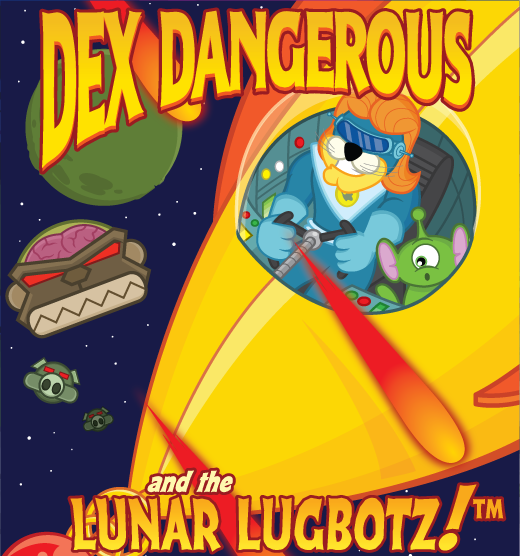If any of you grew up in my generation (which... is probably most of my readers), then you probably at least heard of, if not played devotedly, a stuffed animal/computer game called Webkinz World. It featured your little stuffed friends coming to life online and playing games, working jobs, eating delicious-looking food, etc., and it was the darling of many children as I grew up (myself included, even though my mother actually was the one playing the computer part for the majority of the first years... as I absently tended the beloved stuffed animals). I'd stopped playing it for a while and rediscovered it not too long ago, coming back for a few of my favorite games. One Webkinz game I never liked, though, was Dex Dangerous and the Lunar Lugbotz (mostly because I was terrible at it).

This particular game chronicles the constant warfare between Dex Dangerous, an adventurer and astronaut extraordinaire (a lion) and the Lunar Lugbotz, a group of singularly malignant animalian aliens who are bent on destroying Webkinz World's moon, of which Dex Dangerous is the sole defender. In the game, the simple objective is to use Dex to defend the moon at all costs (when the moon gets enough holes in it from asteroids and alien missiles, it drops back onto the surface of Webkinz World).
Alright. This is all well and good, Belle, but where's the point? When are we getting to the discussion prompt? Okay, okay, I'm getting there. So, in the game, Dex is pretty much invincible - while the asteroids and missiles and such can dent and put holes in the moon, they cannot do the same to Dex. It is presumable that he has some sort-of tiny force-field on his ship that prevents them from damaging him as they would the moon. Here, then, is the dilemma (and the point)...
If Dex has a force-field or protection of some kind on his ship, he could as easily put that small defense on the moon. Now, his ship is a good bit smaller than the moon (about an sixth of its size because, you know, Webkinz is extremely realistic), so if he did use the force-field for the moon, it would cover about a sixth of it, but leave him conquerable, as well as the other five sixths of the moon. Now - this would accomplish immediately the first aim of the game, but only by crippling the means slightly. With the means less viable, the other sixths of the moon have less chance of being saved. But one piece of the moon will surely be saved, no matter what. (This is all disregarding physics, by the bye, as we can't have the moon floating out into space in pieces.)

In philosophical terms, the choices for Dex are to accomplish a part of the ends by sacrificing part of the means' effectiveness, or to try his luck with an extremely effective means but no guarantee of getting to the ends. This brings up an interesting moral dilemma, no? Which is the more efficient - to fulfill part, but not all, of the ends directly and hurt the rest thereby? - or to make the means as effective as possible and stake the ends' chances on that? Characters in books and movies and such make such choices all the time, but it is the writers that have to deal with these conundrums.
So here is my prompt, I suppose. Have any of your characters had to choose between means and a mere part of the ends? Or, if you are philosophically-minded, which seems more fitting to the value of the final goal?
If I'm still not making sense, here's another scenario (equally as nerdy). In the first season of Ninjago: Masters of Spinjitzu, the four main ninja have two goals, the first of which is necessary to accomplish the second: get at least one of the four Fang Blades, and then destroy at least one before the villains can take it back. Now, if one of the ninja had died to acquire a Fang Blade (the first goal), then there would have been one less ninja to fight off the villains and destroy the blade (the second goal). Would this have been counterproductive? Or noble? Or is there an alternative option?

Going back to Dex Dangerous, my sister (much more an expert at the game) assures me that the game would be much harder if Dex was not invincible, even if part of the moon was. If that is the case, then I suppose that would be the logical conclusion. But being easier is not a guarantee of success, nonetheless, and even my sister usually loses the game eventually. Does this mean that it's not easy enough? Or that the other option is more legitimate? Or perhaps it is a paradox altogether?
My own conclusion, I am not sure of. I have my ideas, but I primarily wish by this silly rant to prompt discussion on the dilemma, especially among writers ( who are infamously philosophical), and especially among this particular lovely circle of writers (who are, perhaps, even more infamously philosophical). Answer in a comment, answer in a post, answer in a series of posts, answer in an entire novel, if you like - I would like to hear some good rattling debate about it. Is an effective means more important? Or directly accomplishing any part of the ends? Or is it a chicken and egg scenario?
Whatever your thoughts, however brief or lengthy, I would like to hear them.